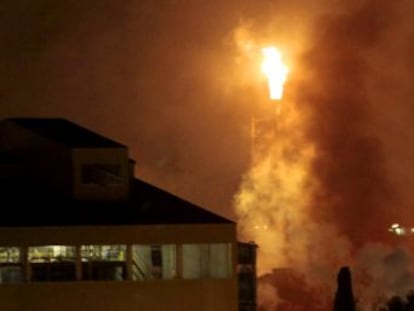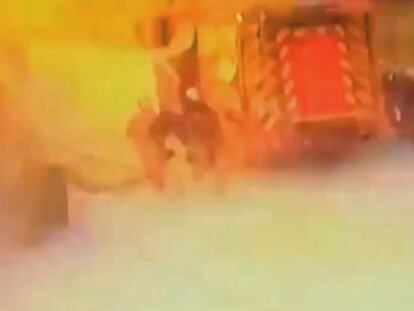Chemical explosion in Spain claims third victim
Another worker has died from the injuries he sustained while plant managers come under fire for not alerting authorities about the accident
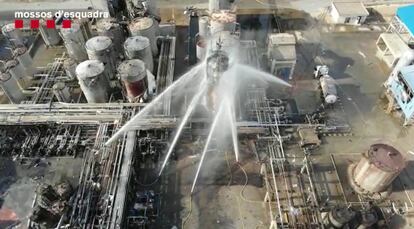
A man who was in critical condition following an explosion at a chemical plant in northeastern Spain has died, bringing the death toll to three.
Another victim of the massive blast in the port city of Tarragona is being treated for major burns and remains in serious condition at Barcelona¡¯s Vall d¡¯Hebron Hospital.
The explosion took place on Tuesday evening inside an industrial zone where petrochemical companies operate large facilities. The investigation points at a 20-ton reactor tank inside a plant that makes ethylene oxide, a flammable gas used to make plastics and detergents.
Shock wave sends reactor lid 2.5 kms?
After the explosion, a reactor lid was sent flying from the force of the shock wave. The one-ton metal piece, measuring 122 by 165 centimeters, hit a residential building in Torreforta more than 2.5 kilometers away, killing a 59-year-old man inside his home.
One of the victims is a man who was sitting inside his home, two kilometers away from the site of the accident. Firefighters have located a one-ton piece of metal that went flying through the air from the force of the blast and slammed into the apartment right above the victim, who was crushed by the falling rubble.
The second victim is a factory worker who was reported missing right after the explosion, which triggered a blaze that firefighters worked all night to contain. The worker was found dead on Wednesday morning.
Firefighters are now working to empty out the oxide tank ¡°to reduce the risk to the surrounding area,¡± said the head of the firefighting crew, Albert Ventosa.
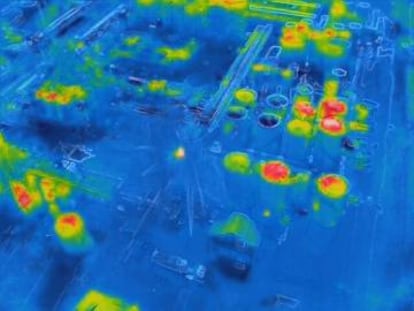
The Catalan civil protection agency said that the company, Iqoxe, did not initially notify authorities about the accident, and that it was concerned citizens who called in beginning at 6.38pm on Tuesday.
¡°We made a round of calls to the chemical companies, and we watched security camera footage. We could see that something was happening, but we could not tell what it was at first,¡± explains Sergio Delgado, deputy director of the Catalan civil protection services. ¡°Protocols stipulate that the first thing a company needs to do is alert [the authorities].¡±
¡°Can you imagine a plant with an explosion and not being able to locate five colleagues? It¡¯s a very difficult situation,¡± said Iqoxe¡¯s CEO, Jos¨¦ Luis Morlanes, in a statement to the media.
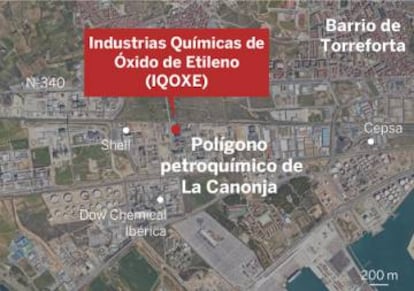
This lack of warning could lead to sanctions, said Civil Protection sources, noting that an investigation is underway to clarify the facts of the case and to determine whether the company¡¯s communication channels were affected by the blast. ¡°These early warnings are one of the weak points of the system,¡± admits Delgado.
The civil protection agency activated an emergency plan at 6.58pm, around 20 minutes after the blast. Firefighter crews accessed the plant at 7.10pm, and at 7.35pm it was determined that there was no risk of a toxic cloud outside the factory.
¡°The plan stipulates that until there is no certainty of a chemical risk, the sirens are not activated. That¡¯s why it was not done,¡± says Delgado.
But before that, at 7.15pm, the agency had asked over 300,000 residents in seven nearby municipalities to remain indoors as a preventive measure. Ten minutes later this order was lifted in all but two of the nearest towns.
Nearby residents reported feeling confused at the fact that they were told to remain indoors yet did not hear the sirens indicating that a chemical accident emergency system had been activated, in an area where people are accustomed to holding annual drills to prepare for such an eventuality.
English version by Susana Urra.
Tu suscripci¨®n se est¨¢ usando en otro dispositivo
?Quieres a?adir otro usuario a tu suscripci¨®n?
Si contin¨²as leyendo en este dispositivo, no se podr¨¢ leer en el otro.
FlechaTu suscripci¨®n se est¨¢ usando en otro dispositivo y solo puedes acceder a EL PA?S desde un dispositivo a la vez.
Si quieres compartir tu cuenta, cambia tu suscripci¨®n a la modalidad Premium, as¨ª podr¨¢s a?adir otro usuario. Cada uno acceder¨¢ con su propia cuenta de email, lo que os permitir¨¢ personalizar vuestra experiencia en EL PA?S.
?Tienes una suscripci¨®n de empresa? Accede aqu¨ª para contratar m¨¢s cuentas.
En el caso de no saber qui¨¦n est¨¢ usando tu cuenta, te recomendamos cambiar tu contrase?a aqu¨ª.
Si decides continuar compartiendo tu cuenta, este mensaje se mostrar¨¢ en tu dispositivo y en el de la otra persona que est¨¢ usando tu cuenta de forma indefinida, afectando a tu experiencia de lectura. Puedes consultar aqu¨ª los t¨¦rminos y condiciones de la suscripci¨®n digital.
